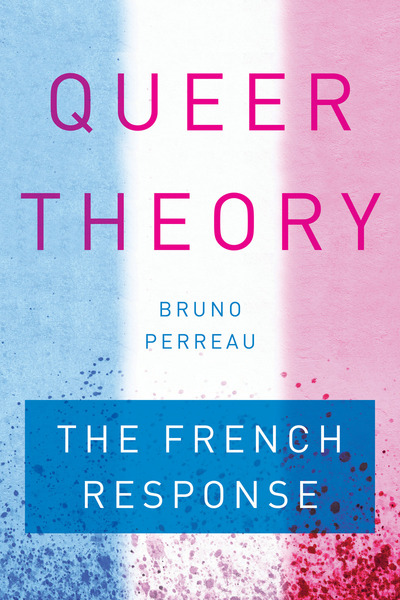Book Review - Anti-Feminism and Anti-Gender Far Right Politics in Europe and Beyond

The proclaimed support of the EU for gender equality is seen as one element in a wider programme of colonization, whereby what was once Marxism is now replaced by gender politics.
The rise, over the last two decades, of the neo-nationalist, populist right is now a well-established fact across the political landscape. But the precise permutations taken and modes of organisation and affiliations on specific issues such as anti-LGBTQ rights, which many of these groups have pursued, is often less well-known. Two recent books, one by Bruno Perreau titled Queer Theory: The French Response (2016 Stanford) and the other edited by David Paternotte and Roman Kuhar titled Anti-Gender Campaigns in Europe, (Rowman and Littlefield 2017) make significant inroads in filling this gap, each of them focusing on Europe, and in particular on questions of sexuality and gender.
‘Natural order’
It transpires that campaigns against civil unions, same-sex marriage and full parenting rights to LGBTQ people were initiated largely from within the Roman Catholic church dating back to the late 1990s. There is a good deal of traffic between lay conservative Catholic campaigners, members of Opus Dei, as well as clerics, who acted as intermediaries bringing to the attention of Vatican scholars, developments from feminism and subsequently queer theory, each of which are perceived as threats to the family and the ‘natural order’.
Over the space of a few years feminism and queer theory has come to be subsumed by the term ‘gender theory’ which is then demonised as a ‘totalitarian’ force, for its attempts to undermine the differences between men and women and the sanctity of ‘holy matrimony’ as the only rightful institution for the bringing up of children.
This invocation of the spectre of Stalinism is clearly a deliberate ploy to instil fear of the return of communism. Paradoxically, ‘gender ideology’ is seen as both American in its endorsement of communities of difference, and state-authoritarian (suggestive of East European socialism) in its attempts to impose a whole new coercive social order. This activity is most pronounced in France, as Perreau demonstrates. Here it finds fertile ground among right wing thinkers and writers, but also from some on the left. Well-known feminist writers like Sylviane Agacinski (married to the former Prime Minister Lionel Jospin) join this chorus of denunciation, characterising gender theory as something ‘monstrous’ emanating from American universities and threatening the very fabric of French society.
The attacks on the French Marriage for All Bill of 2013 presented by the then Minister of Justice Christiane Taubira, came first from Catholic campaigners including clergy and intellectuals and writers, but soon spread to various far right groups.
 This culminated in the shockingly racist attacks by Manif Pour Tous on Christiane Taubira, a woman of French Guianaian origin, with posters depicting her ‘as a half-human half-Godzilla figure, a monstrous emblem of the destruction of the French family’ (Perreau p 60).
This culminated in the shockingly racist attacks by Manif Pour Tous on Christiane Taubira, a woman of French Guianaian origin, with posters depicting her ‘as a half-human half-Godzilla figure, a monstrous emblem of the destruction of the French family’ (Perreau p 60).
Still, it is the machinations of the Holy See that underscore these activities. Various lay activists, writing in their Catholic blogs, claimed to have the ear of the Holy Father and especially that of the theologian and philosopher Joseph Ratzinger both before and after he became Pope Benedict XVI. Perreau traces the pathways of such figures as they provide their own take on queer theory, as the American Opus Dei member and writer Dale O’Leary who lampoons it in her book The Gender Agenda. Advocating gender identity, according to O’Leary is comparable to choosing one’s daily wardrobe and make up, a maliciously profound mis-reading of Butler’s influential Gender Trouble of 1990. Perreau says that these tracts by O’Leary and others were purportedly made available to the Pope, who, along with his Cura, in turn produced a number of philosophical responses, all published and widely distributed.
The Vatican, from Pope Benedict XVI to the current Pope Francis goes to great lengths to hold at bay this idea of gender equality which they see as sweeping Europe and well beyond, undermining ideas of ‘human ecology’ which have preserved the anthropological nuclear family over the centuries. If feminism, from the late 1960s onwards, disturbs this idyll of happy family life by supporting divorce, birth control and rights to abortion, these more recent activities culminate, as the Cura sees it, in LGBTQ people assuming equal rights to those of the heterosexual majority, and in the dissolution of sexual difference.
Perreau traces activities which connect upper middle-class Opus Dei Catholics with members of the Front Nationale and various other far right organisations including the fascistic Bloc Identitaire. At the heart of these mobilisations is Manif Pour Tous which borrows a good deal of its tactics from the left, including street demonstrations with silent marches and street pray-ins. These groups are constantly monitoring changes in French life, for example, lessons on gender equality in the school system which they see as eating away at the fabric of French life, in much the same way as they blame feminism for destroying romance.
A class dimension
Bruno Perreau has done a remarkable job in order to make the case that the nation itself was perceived as under threat by LGBTQ activists. He alludes to the fact that single women in France are not permitted access to IVF, thus showing the entire field of sexuality to be indisputably the prerogative of the heterosexual nuclear family.
He also argues that a great deal of effort was made within these political circles in France, from the mainstream to the margins, to ensure that granting LGBTQ rights of marriage did not fundamentally disturb the seemingly harmonious and God-given union of family and nation state. Even the majority of feminists and supporters of the Socialist Party in France seem to have fallen into line with this deeply conservative stance.
It goes without saying that the hundreds of thousands of people in France, especially of immigrant background, whose family lives for various reasons diverge from this pathway must then be envisaged as failed, and stigmatised as such.
Likewise women without a partner and hoping nevertheless to be able to become a mother are forced to look outside France for IVF. They too must experience condemnation and condescension as single mothers.
Inevitably there is a class as well as a racial dimension, since poverty and unemployment often make the nuclear family an unfulfillable reality for so many. Overall Perreau shows how antiquated fears of a gay conspiracy combined with fascination for this still ‘deviant’ sexuality, linger deep within the psyche of the white French political classes. And where the RC church heartlessly still disapproves of adoption for the reason that it ‘condones adulterous behaviour’ we can see why Perreau and the activist groups such as Les Tordues who in the context of these neo-nationalist upsurges have struggled for the full range of LGBTQ rights, feel the urgent need for a community of belonging.
French and German common-sense
In Anti-Genderism Campaigns in Europe, Paula-Irene Villa provides the most succinct account of what is now frequently referred to in Germany as anti-genderismus. This has a different lineage, and is less orchestrated by the Catholic church. Instead it emerges more directly from the mainstream as well as the populist right, but also from within the ranks of academia, and finds ample grounds across the German media, from quality press such as Die Zeitto feminist magazines such as Emma. This campaign works by appealing to the common-sense of the nation against what is claimed to be the extremes of ‘gender ideology’.
What Paula-Irene Villa understands as ‘post-essentialist’ definitions of gender as ‘not determined by nature’ but rather by ‘complex socially instituted’ differences, has led to both outrage and ridicule, and within the university system to claims that gender research is not scientific.
Although well-known German feminists such as the journalist Alice Schwarzer, founding editor and owner of Emma magazine, have controversially joined this anti-genderismus chorus, there is at the same time a deep connection between anti-feminism and the anti-LGBTQ campaigns.
The informal and deeply conservative settlement reached in what was then west-Germany from the late 70s in response to feminist demands for equal access to labour markets, was to make a full professional working life more or less antipathetic to having children. Lack of quality child care and the school day finishing at 13.30 required costly and elaborate arrangements, again a clear disincentive to women to the point that being a feminist and /or lesbian meant in effect not being a mother.
 Post re-unification the right and its allies in the press and on TV easily invoke the spectre of ‘forced labour’ and of the GDR working women into the ground, in order to promote the ideal of the stay-at-home mother (as does incidentally the well-known Marxist sociologist Wolfgang Streeck).
Post re-unification the right and its allies in the press and on TV easily invoke the spectre of ‘forced labour’ and of the GDR working women into the ground, in order to promote the ideal of the stay-at-home mother (as does incidentally the well-known Marxist sociologist Wolfgang Streeck).
Honest speaking out
There are various other voices who join this cacophony of outrage including for example many with grievances against the feminist left such as the journalist Bettina Rohl, daughter of Ulrike Meinhof. Rohl’s right wing stance leads her to blame the EU as over-interventionist especially in regard to its ‘gender mainstreaming’ policies.
Villa reports how after decades of feminism still the image of the working mother is routinely disapproved of. ‘For many Germans, working mothers do not therefore embody an appropriate social model’. This kind of public discourse finds wide readerships and audiences by affecting a simultaneously heroic and purportedly honest stance, one that suggests the author is daring to speak out, (echoing Trump when he declares that he tweets what others think but dare not say).
Across many other member states, the EU is blamed for endorsing this ‘gender agenda’ to the detriment of traditional family life. Indeed the proclaimed support of the EU for gender equality is seen as one element in a wider programme of colonization whereby what was once Marxism is now replaced by gender politics.
This again reflects increasingly evangelical Vatican fears about losing its grip amongst Catholics across the world, especially the young. In Italy it is reported that parents are encouraged to phone an anti-gender helpline to report ‘indoctrination’ of their children at school, in what is seen as an ‘anthropological emergency’ even by leading figures from the left.
European sexual politics
Above all, these volumes speak to the dangerous convergences of interests from the RC church, the far right, the neo-fascistic right, to the mainstream parties of the right, while also finding some traction within the left and within strains of liberal feminism.
They converge on a specific vocabulary which envisages new feminisms and LGBTQ politics as embodying a profound threat to national culture and to social reproduction. If such alliances and cross-fertilisations have not found the exact same opportunities in the UK, for example, this should neither blind us to the distinctive contours which anti-feminist hostility and anti-LGBTQ opposition take, nor should it permit any basking in some badly-needed respite of temporary solace. (I am not immune to grasping onto shards of hope. The need for fantasies of ‘progress’ is sometimes irresistible.)
The UK government is less vindictive in the policy environment it has put in place for transmen and women, especially youngsters. A historically more progressive youth and pop culture contribute to a ‘common culture’ which in turn has a more socially mixed audience and readership than in many other parts of Europe.
But against this many have pointed out that after the Brexit vote was reported, hate crimes against non-white people, against white east Europeans, and against LGBTQ people rose remarkably. This is undeniably the case. Perhaps one lesson also emerging from these discussions is the added effort needed on the part of British ‘remainers’ to find ways of maintaining full participation in European sexual politics.
Angela McRobbie is Professor of Communications at Goldsmiths College, London, and the author of Be Creative: Making a Living in the New Culture Industries(Polity Press 2015).
This post first appeared on:



